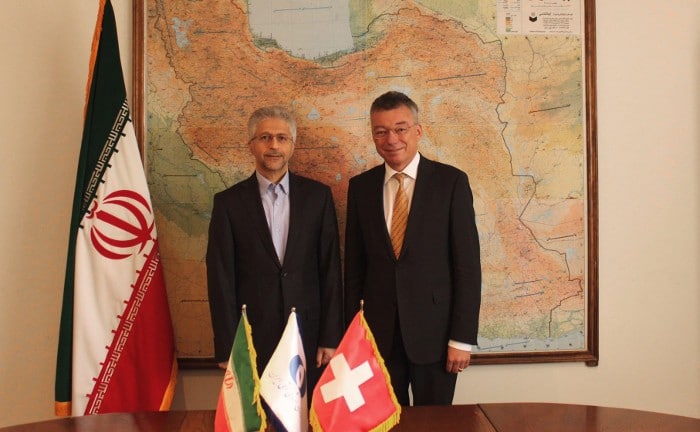Swiss and Iranian Safety Authorities Exchange Information on Civil Nuclear Safety

Hans Wanner, Director General of the Swiss Federal Nuclear Safety Inspectorate, ENSI, and Chairman of the Western European Nuclear Regulators’ Association, WENRA, accompanied Swiss President Johann Schneider-Ammann on his trip to Iran over the weekend. As part of the scientific delegation, he met with Naser Rastkah, Head of the Iran Nuclear Regulatory Authority, INRA.
Their discussions focussed on possible bilateral cooperation in the area of civil nuclear safety. “I had the opportunity to provide the head of the INRA with a detailed understanding of the safety requirements of WENRA and their concrete implementation in addition to the Swiss safety philosophy,” explained Hans Wanner after the meeting.
The INRA showed great interest in receiving assistance in matters of safety culture, the construction of the necessary regulatory framework and management system. “I am convinced that we can support the Iranian authorities. However, the question of ‘to what extent’ is still open,” said Hans Wanner. In the coming months ENSI will examine and prepare the next steps in regards to cooperating with Iran.
The Swiss Nuclear Regulatory Authority already maintains bilateral relations with the regulatory authorities of other countries. INRA, has in turn established bilateral relations with several other countries since the conclusion of the Joint Comprehensive Plan of Action, JCPOA, in the area of nuclear safety.
Joint Comprehensive Plan of Action JCPOA
In July 2015, Britain, France, Germany, the USA, Russia and China on one side agreed with Iran on the other side on a long-term solution after more than twelve years of conflict surrounding the Iranian nuclear program.
The agreed-upon Joint Comprehensive Plan of Action, the JCPOA, establishes technical limitations and control mechanisms that ensure that Iran’s nuclear program is exclusively used for peaceful purposes and cannot be used for the development of nuclear weapons. The action plan allows, inter alia, for Iran to cooperate with other countries in the field of civil nuclear safety.
After the International Atomic Energy Agency, the IAEA, confirmed in January 2016 that Iran had fulfilled its most important obligations under the nuclear agreement, the economic and financial sanctions that had been imposed up till then were lifted.
The strengthening of the Iran Nuclear Regulatory Authority and international cooperation in the area of safety of civilian nuclear facilities are in line with the JCPOA. Furthermore, this is explicitly desired by all signatories of the JCPOA.

